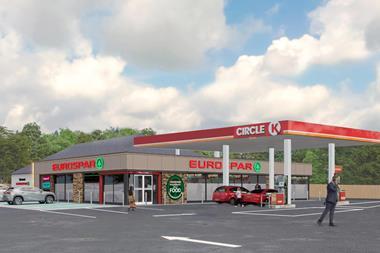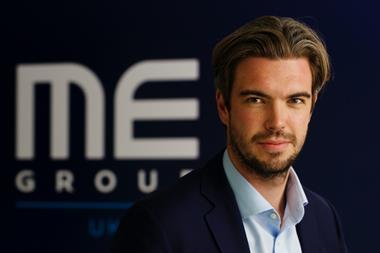With so much technology being introduced on forecourts and in stores it could be easy for attention to waver from the tanks and pipework buried underground, but constantly ensuring they are in good condition is one of the most crucial tasks facing dealers. The fine of £8m imposed on Tesco last summer for a fuel leak at its Haslingden site, is a chilling reminder of the potential penalties if something goes wrong.
One of the biggest challenges to the integrity of tanks and pipework is the impurities that find their way in over time, even in the best-run sites. Microbes can develop in the fuel, with some types causing clogging of filters while others will cause pitting in the surface of tanks, and water can accumulate, especially where biofuel is involved. Where issues occur fuel polishing is one option, but P&C Services takes a more holistic approach. Managing director Richard Quarmby says: "When a dealer reports a problem with their tanks, instead of just saying we’ll clean the tank out with a filtration system, we detect the root cause. We take samples at the nozzle and at three parts of the tank top, middle and bottom and they are sent to the lab to be tested. We give the customer a report with a traffic light system on what is actually in their tanks, what the problems are and then we offer a solution."
An amber warning for a tank means it has issues but these can be monitored, while red means it requires action. Quarmby says that where severe contamination has been identified, cleaning out the tanks has uncovered leaks not reported by wet-stock management or tank testing. Where work is required P&C can carry out fuel cleaning, cleaning and repairing tanks, and single- and double-skin tank lining. Quarmby recommends that fuel should be tested regularly so that any issues are picked up before they cause serious problems, checking petrol every year, with six-monthly tests for diesel. P&C currently monitors more than 600 tanks across the UK.
Certas Energy uses other services to carry out regular monitoring of pipes and tanks on its forecourts, says retail operations manager Colin Levy. He explains: "Wet-stock loss is potentially the third-largest cost drain on a forecourt and we use the services of experts such as Vianet, Fairbanks and Suresite to protect our assets. We have invested significantly in the use of tank lining technology to prolong the life of tanks and have also more recently worked closely with LCM Environmental.
"Its Petroscope system is a cost-effective way of evaluating the interior condition of steel, lined and fibreglass tanks. After uplifting the fuel and inerting the tank with nitrogen, a robotic camera is inserted into the fill pipe of the tank. The technician begins systematically scanning the tank, zooming in closely on suspect situations. The camera is able to observe anomalies such as pits, rust, obvious water intrusions, streaks and cracks which affect the integrity of the tank. We’ve used this procedure about nine times in the past year."
Specialist tank companies have been expanding their services, with Eurotank Service Group opening a new customer helpdesk in Hebden Bridge, West Yorkshire. The new team is headed by Michelle Brocklehurst, who has 10 years experience of running a dedicated petrol station facilities management helpdesk for a major supermarket network.
In addition to its new helpdesk, Eurotank is at the end of the first year of implementation of a new mobile workforce system, which allows it to plan, track and report on the status of all jobs, in real time. Eurotank managing director, Ed Wheeler, explains: "We have made a significant investment in ATEX-certified smart phones, which allow our field personnel to capture pictures and data in an on and offline workflow system. We believe we are the first tank/service company to invest and implement this kind of software.’’
With all the speculation about the future of liquid fuels, Wheeler expects there will be an increase in demand for his company’s service to extend the life of underground fuel storage tanks, . He says: "Eurotank offers a full range of tank upgrade services, from an inspection, testing and repair service to building a new double-skin GRP tank inside the existing single-skin steel or GRP tank. We are also starting to see failures of double-skin steel tanks on both the outer and inner skins. This can cause considerable cost to retailers in terms of both fuel contamination from the liquid glycol interstitial fluid leaking in and mixing with both petrol and diesel, and also from the cost of replacing the secondary containment, through lining, if the outer skin has gone.’’
Nigel Plumb, managing director of DP Fuel Tank Services, says his company is planning to expand its operations. He is remaining tight-lipped about the details, but reveals: "We are finalising arrangements for introducing a new service, based at new, larger premises, near to our existing headquarters in Redhill, Surrey."
His company has wide experience of dealing with tanks on forecourts. He explains: "While we do not replace tanks, we do safely remove them when they need replacing and clean and line them, with the help of a partner, when that is required."
When it comes to pipework and other equipment serving tanks, OPW has been developing a range of customised solutions. OPW regional sales manager, David Crowther, explains: "Last year we introduced a new Fibrelite S87 remote-fill sump. This was designed alongside BP UK as an easy-install solution for a selection of their sites. For this, we developed one of our existing below-ground remote-fill systems to accommodate alternate pipe-exit positions. The system is factory fitted with KPS piping and Fibrelite pipe-entry seals.
OPW also offers KPS piping in custom lengths. Last year it carried out a project for a wholesale retailer building a new petrol station in Manchester. It manufactured custom 10m lengths of 75/63mm KPS straight piping to transport fuel between dispensers instead of the standard 5.8m lengths. This allowed a faster, more efficient installation of a continuous pipe run for the customer by reducing the number of welds required.
Adapting to enhanced regulations
In the first quarter of 2018 it will be a fundamental requirement of any forecourt operator with single-skin pipes or tanks to implement wet-stock management, says Dan Gibson, Suresite’s wet-stock manager. For smaller forecourts, this may sound like a nightmare but he says it need not be.
"At Suresite we anticipated this change to the Blue Book and working with our partners, Leighton O’Brien, we introduced a no-nonsense system called Suresite Core that provides effective monitoring and peace of mind. Core is geared towards the smaller operator and alongside the critical task of detecting any loss of product, it also enables a dealer to improve stock control and delivery planning. Some companies are only able to offer a system that will be far too elaborate and costly for smaller dealers."
For larger dealers, Suresite and Leighton O’Brien also offer Suresite Live.
Case Study: JP&S Services, Hook, Hampshire
JP&S Services took over Phoenix Green in Hook, Hampshire, and at the same time moved from the existing fuel supplier to the Jet network. Yogan Visvanathan, director of JP&S Services, comments: "When we took over the site it was immediately obvious that the tanks and pipework needed considerable investment. We appointed MDM Services (Cardiff) as our main contractor.
"The residual fuel was uplifted and gas was removed from the tanks. The tank lids were removed and we had the tanks cleaned internally. All four tanks were double-skin relined by Abfab to the European Standard BS EN 13160-7, using Abfab’s latest coatings and a vacuum monitoring system. This has a touch screen showing vacuum levels in tanks and provides continuous data logging with optional wifi connectivity for instant alarm notification. Stainless steel transducer valves were installed in all the tank chambers.
"All existing steel pipework and islands were removed and a new island installed with new plastic pipework, supplying four grades to three pumps with VR2. Atlas tank lids were retrofitted to existing manways and new above-ground offset fillpoints were installed to improve the tanker offloading position. A new Veeder Root TLS-350R tank gauge was installed.
"The forecourt drainage was cleaned as it had been blocked from years of little or no cleaning. The interceptor was cleaned and the drainage was rerouted correctly to foul drainage. The tanker offloading drainage was replaced and the forecourt entrance and exit drainage were replaced with 150mm channeling.
"MDM carried out the bulk of the work on site, including all pipework and pump installations, plus all civils work. They subcontracted to Abfab to carry out double-skin relining to four underground tanks and brought in Ancorra to carry out all tank cleaning services."
Yogan says MDM Services has always been his first choice when it comes to any kind of work on the forecourt. "They are trustworthy, reliable and professional. We trust them to do the work with minimal stress to us and they always deliver. The subcontractors MDM chose were also known to us and have worked on our past developments and we’ve always been happy with their work."
The works took three months and the site was closed throughout.



























No comments yet